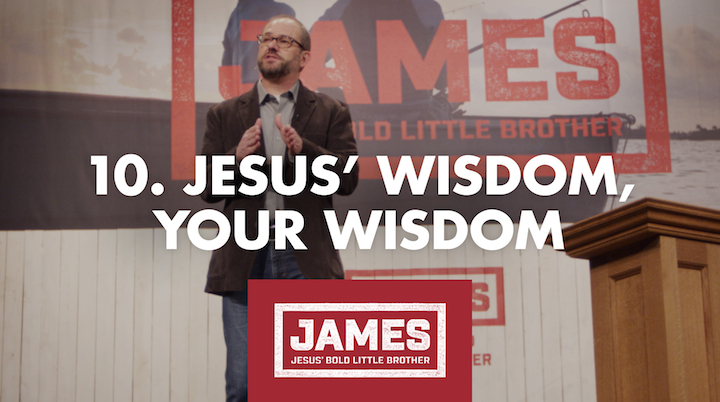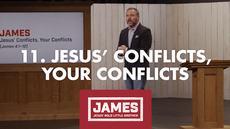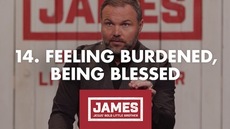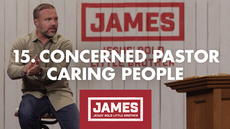
Can’t see the video? Download and install Flash to be able to view. Get Flash Here
James says there are two kinds of wisdom people can have: an earthly wisdom marked by bitter jealousy and selfish ambition, or a wisdom from above that Jesus had and freely gives to those who ask. This sermon explores seven traits of Jesus’ wisdom.
13 Who is wise and understanding among you? By his good conduct let him show his works in the meekness of wisdom. 14 But if you have bitter jealousy and selfish ambition in your hearts, do not boast and be false to the truth. 15 This is not the wisdom that comes down from above, but is earthly, unspiritual, demonic. 16 For where jealousy and selfish ambition exist, there will be disorder and every vile practice. 17 But the wisdom from above is first pure, then peaceable, gentle, open to reason, full of mercy and good fruits, impartial and sincere. 18 And a harvest of righteousness is sown in peace by those who make peace.
The Holy Bible, English Standard Version copyright © 2001 by Crossway Bibles, a publishing ministry of Good News Publishers. Used by permission. All rights reserved. Quotation information.
Who is the wisest person in the room today? Now, before someone raises his or her hand, let’s ask a second question. How would we find out? How would we know? Would we give an IQ test? Would we want to administer a Bible quiz?
According to the Scripture, wisdom is the data that we have in our heads, but it also is the disposition of our hearts and the deeds of our hands. Glad you’re here as we continue our study in James 3. We’re going to cover verses 13 through 18 today, and as we do so, I want us to ask two questions. First, what does Jesus’ wisdom look like? How do we identify the wisdom of Jesus? Then secondly, how do we have more of Jesus’ wisdom in our lives? Before we do anything else, let’s pray.
Father, thank you that you are a kind, loving, and gracious Father. Thank you that you’re a God, according to your Word, who commits to us that you will give us wisdom when we ask for it. Thank you that you love us with all the love and affection you have for your Son, Jesus. Father, thank you that you called this meeting together today because you want to be worshiped.
Father, I especially thank you that today, you’ve called some people to be who aren’t yet Christians, who I pray and hope will meet Jesus in the next few minutes that we have together. Jesus, thank you that you, being eternally God, humbled yourself, and you took on the form of a human being, and you walked this earth, and you lived the only perfect, righteous life that’s ever been lived.
Jesus, you went to the cross, and there on the cross, you took upon yourself our sin. You died for us. You took the penalty for sin that we deserve. Thank you Jesus that the grave couldn’t contain you. Thank you that you’ve risen from the dead, that you are at the right hand of the Father, and we want to worship you today. Father and Son, thank you for the Holy Spirit. Holy Spirit, we pray that you would help us see what wisdom is. We pray that you would give us a desire in our heart for greater wisdom.
Holy Spirit, I especially pray for those today with us who don’t yet know Jesus, that they would experience your birth, that they would be born again, that they would meet Jesus and be forever transformed. In his good name we pray, amen.
We’re going to begin in James 3:13. Pastor James, Jesus’ half-brother, has been warning teachers. And specifically, last week, as Pastor Mark preached to us, we learned that teachers need to be careful with words, that words can be very helpful, productive, and fruitful, and words can be very destructive. So as Pastor James continues to talk to teachers today, he introduces the concept of wisdom. And the first thing I want you to see about wisdom is this: wisdom is as wisdom does.
James 3:13, “Who is wise and understanding among you? By his good conduct”—pay attention to that phrase—“let him show his works in the meekness of wisdom.” Wisdom is as wisdom does. Wisdom isn’t merely data we collect in our heads, but it’s also the disposition of our hearts and the deeds of our hands.
There’s a biblical distinction I need you to understand between knowledge and wisdom. You can’t have wisdom without knowledge, but it is possible to have knowledge without wisdom. I think Pastor Mark gave this great definition a few weeks ago when he was preaching through James 1. This is what he said; listen to this: “Knowledge is knowing the truth; wisdom is knowing what to do with it. Knowledge is theoretical; wisdom is practical. Knowledge is truthful; wisdom is useful.” Listen to this: “Knowledge provides information; wisdom provides transformation. Knowledge tells you what to believe; wisdom tells you how to behave.” Wisdom is as wisdom does.
I am fortunate to have a wife of 27 years this coming December, Kara. She’s not a perfect woman, but she loves Jesus more than any person I’ve ever met in my life, and it’s a joy to be her husband. And I also have four daughters, all between the ages of 23 and 15, so most of my adult life, I have been swimming in a sea of estrogen. And when my girls were little, I remember this scene unfolding on a regular basis where we were getting them reading for school, and one of the last things that Kara, my wife, would do with my daughters is take them into the bathroom to help them comb their hair. And she would get hair into ponytails and pigtails, or whatever was common for the day.
Imagine this: occasionally, one of my daughters wasn’t pleased with the work her mom had done, and she would angrily say, “Mom, you’ve done it wrong! I want to be pretty today. Fix it.” And in every instance—and I’ve seen this scene so many times play out in my home—my wife Kara would bend down on her knees, she would take their hand—their face in her hands, and she’d look them in the eye, and she would say, much like her mother said to her in the same circumstance, “Honey, pretty is as pretty does.” That’s biblical wisdom. That’s what it means to be wise. It impacts the data that’s in our head. We have knowledge, but it also affects the disposition of our heart and the deeds of our hands.
Now, here’s what Pastor James is about to do. He’s going to contrast two types of wisdom. He’s going to contrast for us a natural, earthly wisdom with the wisdom that Jesus gives. So, let’s understand better what earthly wisdom is all about.
Verse 14, “But if you have bitter jealousy and selfish ambition in your hearts”—I want you to pay attention to that—“do not boast and be false to the truth.” If you have an old school Bible like mine, circle that phrase. If you’ve got a smart phone and you’re looking at a Bible app, then highlight that in some way. We’re going to start there in just a moment. “This is not the wisdom that comes down from above, but is earthly, unspiritual, demonic. For where jealousy and selfish ambition exist, there will be disorder and every vile practice.” One thing we can do mistakenly when we come to the Bible is isolate ourselves from the author of the text. We can miss the emotion, if you will, the ambiance, the ethos of a passage. I want you to think for just a minute who it is that’s writing this text. This is James. We believe him to be Jesus’ half-brother, Jesus’ little brother.
Probably, you could accurately say that nobody on the face of the earth, during the penning of this letter, knew Jesus better than James. James grew up with Jesus. He saw Jesus throughout his life. It’s clear that James, in some way, was in and out of Jesus’ earthly ministry. When Jesus dies, is resurrected, and sends the Holy Spirit, and the church takes footing, James is one of the preeminent leaders in the church. So, James is speaking with authority, and what James is saying with this phrase is, “Stop lying.” Stop lying.
There are people who are representing Jesus who don’t know him well and don’t have a wisdom that comes from him. And he’s frustrated and he’s confronting them because he’s the expert on who Jesus is, and there are people who are representing Jesus and actually misrepresenting him.
Can you sympathize with Pastor James? You ever been in that circumstance? I’m sure this has never happened to you as a parent. Perhaps it’s happened to me. You ever had an adolescent child tell you you don’t know anything? “You don’t understand how it is today, Mom.” “You don’t get the way the world has changed, Dad.” “Things are totally different today. You don’t understand what I’m going through. Your experience isn’t really relevant here,” right?
Maybe some of you are medical doctors, been through years of training, have years of experience under your belt. You take a patient in, you carefully examine her, you examine him, you reflect on all the scientific data that you come up with you, you come up with a diagnosis and a prognosis. That patient sets up a follow-up appointment, comes back to you, and says, “You know, Doc, I’ve been online and there’s this website, WebMD, and I just want you to know I question every opinion you have, and I want a second opinion,” right? That’s how James feels.
Hypothetically, perhaps there’s an owner and a general manager of an NFL football team. Let’s just say his name is Jerry Jones. And let’s say Jerry Jones goes, and he looks at a recap of a live chat that happened on the Dallas morning news, and he comes across one comment from a man who never played beyond high school football, has no sporting professional experience in his life—as a matter of fact, he’s been a pastor for 20 years—informing Jerry Jones on how to run his team so they can begin to compete with the World Champion Seattle Seahawks. Now, I’m just—that’s a personal confession I think I need to make before you. That’s not pastoral observation.
Jesus, forgive me. Mr. Jones, forgive me as well. That would be insulting. That would be offensive. Pastors. Pastors out there, sometimes you occasionally will have young men show up who will simply say, “I’ve been podcasting Mars Hill Church, and you need to run your church in a better way.” We want you to know upfront we’re sorry for that. That’s not our intention.
Do you feel James’ frustration? James knows Jesus better than anybody probably on the face of the earth, and there are people that are going out and they’re misrepresenting Jesus. They’re claiming to belong to Jesus, but they don’t know him. They’re claiming to teach the Bible, but they don’t understand the Bible through the lens of Jesus. So, I want you to keep that in mind as we look at what’s happening.
Now, two things are going on in the heart of those with earthly wisdom, two things that are not good things, two affections. One is bitter jealousy and the other is selfish ambition, cohabiting in the heart of those who don’t have Jesus’ wisdom. I want you to understand that. Wisdom isn’t merely the data that we have in our heads; it’s the disposition of our heart. The best place to go to really evaluate whether or not you are acting in wisdom is to take a look at your heart, become a spiritual cardiologist, take a look deep within.
There are those who are teaching the Bible who are falsely motivated, first in relationship to others, because as they look around them, take in the landscape, and see what’s going on, they’re envious of others who have, perhaps, a stronger gift or greater influence. So, their motive in teaching is jealousy, covetousness. They’re bitter, they’re angry, they feel cheated, they’re in a competitive state with others around them. Even worse, they don’t understand the glory of Jesus, because they’re motivated by selfish ambition. Every teacher who knows Jesus understands that his fame, his name, his worth is preeminent. And there are those who are teaching from an earthly wisdom, who are not only jealous of other teachers around them, but they’re doing it merely to make a name for themselves.
Now, I want you to see the origin of where this comes from. Three different things that James tells us is the origin of this wisdom.
First of all, it’s earthly. It’s of the earth; it doesn’t come from heaven. And we’ll talk about what that means in just a moment, but this isn’t a wisdom from above, this is an earthly type of wisdom.
Secondly, it’s unspiritual. Literally, it means soulless. The Bible teaches us this. The Bible teaches that those of us who are in Christ have what we call “the flesh.” It’s not the material part of who we are, but it’s that residue of our old life before Jesus. It’s that part of us, and most of us are really in touch with this, right, that resists God, that rebels against God.
That’s the essence of this type of wisdom. It’s of the earth, it’s fleshly, it’s unspiritual, and in extreme forms, it is supernatural, but not in a good sense, in a very evil sense. It’s demonic. There were teachers who were frustrating Pastor James because their motive for teaching was entirely impure. It was to compete with other teachers, being jealous and envious of other teachers, and it’s to make a name for themselves. And James clearly understands the origin of this wisdom. It’s of the earth, unspiritual, and can be demonic.
But I think what bothers Pastor James much more than anything else is the devastation it brings to the church, because look at what happens when someone teaches from that motive: “There will be disorder and every vile practice.”
The church is at war. When someone is teaching from this perspective—from bitter jealousy and selfish ambition, from an earthly perspective, an unspiritual way, demonically influenced—the result in the church is devastating because there are factions, and infighting, and people are devouring and competing against one another. And not only that, there’s every vile practice. That basically means everything they do is worthless. It’s nonproductive. People aren’t becoming more and more like Jesus when the teacher who’s teaching them has bitter jealousy, selfish ambition.
Do you have earthly wisdom today? “Well, Pastor Dave, how would I know?” Look into your heart. What do you find there? Is there bitterness? Is there jealousy? Is there a deep desire to make much of yourself? If so, I want you to come to terms with the fact that it’s not only devastating to you but devastating and hurtful to those around you.
I know this from first-hand experience. I planted a church years ago. Today, that church is Mars Hill Albuquerque. I felt a strong calling from Jesus to plant that church. I left a good church that sent me out with blessing and support.
As I began to plant that church and lead that church, something happened in my heart that wasn’t good. I suddenly began to look at leading a church as if it was a competitive sport. I began to keep score. I began to look around at others who had planted churches and saw they were doing better than I was, and to be really candid, I resented them. I began to see it as an opportunity to add more points on the scoreboard so that I could beat them, even though we were on the same team.
To make matters worse, my worth and my identity were totally tied up into the role of being a church-planting pastor. It’s brutal. My motive became very tainted along the way, and I began to lead the church from a perspective—if Pastor James was speaking into my life—as a place of earthly wisdom.
The result to the church was devastating. People were fighting all the time. I felt like I was pastor of Survivor Island. Factions were being formed, and people were being voted out, and it was just not going well. And probably the most frustrating aspect about all of it—lives weren’t being transformed. People weren’t being changed. People seemed to be stuck in their rebellion against God. And it was so exhausting, so tiring that Kara and I gathered around some close friends, and we began to pray that Jesus would give us a hall pass, that he would let us move on, that he would take us and transport us in to a healthy church where we could have a new start.
In the midst of all this experience, I had a day of solitude where I was fasting, praying, and studying the Scripture. I went out and looked over the city that I was living in at the time, Albuquerque, and the Sandia Mountains. I got a vantage point of the city and just prayed from a heart level, “Jesus, help me here. What do you want me to know?” And I didn’t hear an audible voice, I had this impression in my heart, and it was as if Jesus was saying to me, “I want you to stay where you are, but I want you to do church by my book.”
So, I began to pour into the Scriptures and I realized, confessed, and repented of the fact that I was leading this church from a place of bitter jealousy and selfish ambition. Now, God is good. God is forgiving. God redeems all things. Today, Mars Hill Church Albuquerque is one of the healthiest locations that we have in all of Mars Hill. The church is up over 1,000 people, but even more importantly, over 600 people have been baptized over a three-year span. I’m grateful for what Jesus has done. What does Jesus’ wisdom look like? We don’t want to be, as Christians, those who are filled with earthly wisdom, do we? We want Jesus’ wisdom.
How do we get it, and what does it look like? Back to our text. Verse 17, “But the wisdom from above is first pure, then peaceable, gentle, open to reason, full of mercy and good fruits, impartial and sincere. And a harvest of righteousness is sown in peace by those who make peace.”
I want you to understand what James means when he talks about a wisdom from above. He’s making a very powerful, poignant point that we don’t want to miss. What James is saying is that none of us has, intrinsically, inherently, the wisdom that God has. For us to have wisdom, we need an infusion from above.
What the Bible teaches us in a very compelling way is, the only way that you and I will ever have the wisdom that Jesus had is through the person and work of the Holy Spirit. As Jesus lived his life on earth, particularly in the Gospel of Luke, we see over and over again that Jesus grew in wisdom and stature through the ministry of the Holy Spirit. And we desperately need the Holy Spirit today so that we may, first and foremost, have the same wisdom that Jesus had.
If you don’t believe me, let me prove it to you. Look in your Bibles at 1 Corinthians 2:11–13. 1 Corinthians 2:11–13. “For who knows a person’s thought except the spirit of that person, which is in him?” Is that true or not? I don’t know what you’re thinking. You know what you’re thinking. Your spirit knows what your mind is thinking.
You know how I know this to be true? Because I’ve been married for almost 27 years. Nothing frustrates my wife more than when I try to finish her sentence and I’m wrong. Like, “That’s not what I’m thinking.” “Oh, sorry.” What makes her even more frustrated, rightfully so, is when I try to guess what she’s feeling. “Hey, I know you’re really mad at me.” “I’m not mad at you!” “Well, now you are.” But there’s this idea that only in her spirit does she know what she’s thinking, right?
Ladies, that’s true of men. Are men a mystery to you? Yes, amen. Through the lens—thank you, sister. Through the lens of your husband, men are a mystery. Only he knows what he’s thinking. I can’t guess anymore, right? We would accept that to be true of people. What if it’s true of God also? “So also no one comprehends the thoughts of God except the Spirit of God. Now we have received not the spirit of the world, but the Spirit who is from God, that we might understand the things freely given us by God.”
Verse 13, don’t miss this point: “And we impart this in words not taught by”—what kind of wisdom? “Human wisdom”—that’s earthly wisdom—“but taught by the Spirit, interpreting spiritual truths to those who are spiritual.” We need the Holy Spirit. The Holy Spirit enlightens us to discern what the Bible means and he empowers us to do what the Bible says. What the Holy Spirit, the third member of the Trinity, does is take the perfect and finished work of Jesus and apply it to our lives through the truths of the Bible.
If we’re going to have Jesus’ wisdom, we desperately need the Holy Spirit to do his work in us and through us. If there’s anything you leave with today, I want you to leave with a deep dependence upon the Holy Spirit, because if we’re going to have the wisdom that’s from above, the Holy Spirit has to bring it to us through the truth of the Bible, interpret it through the finished work and person of the Lord Jesus Christ.
What does Jesus’ wisdom look like? Seven things in this text.
First, it’s pure. Don’t you love that? Above all, it says, the wisdom from above, first of all, is pure. That has to do with the heart. That’s a motive statement. When you read the story of Jesus and the Gospels, don’t you love seeing his motive unveiled? Jesus is always about two things and two things only: he wants to worship God and he wants to love and serve others.
Isn’t that amazing? So, if you and I have the wisdom of Jesus, that will be the pure motive of our heart, that everything we do in all of life will ultimately be motivated by the fact that we want to worship Jesus and we want to love and serve others. We want to be pure. We don’t want tainted motives, because the wisdom that comes from Jesus through the work of the Holy Spirit and the truth of the Bible is pure.
When my kids were growing up, they loved a breakfast beverage that was the most disgusting thing I’ve ever had in my life called Sunny Delight. Any Sunny Delight fans? Oh, that’s what’s wrong with our culture today: most of us were raised on that. As a matter of fact, it was such a part of our family, kids just referred to it as Sunny D. “Yo Dad, breakfast, Sunny D.” You know, that’s how they would come to the breakfast table.
My wife was going out of town to visit some family members, and so I had daddy duty for the whole weekend, and Saturday morning was my specialty. I’d get up Saturday morning and make waffles, and I had this brilliant idea. I’m going to introduce my children this Saturday morning, where their mom’s not here, with 100 percent pure Florida orange juice. So, I went to the supermarket, I found a carton. I knew it had to be true because on that carton, it said, “100 percent pure Florida orange juice,” and it cost ten times more than Sunny D.
Put it in the refrigerator, got ready for Saturday morning. Kids started waking up Saturday morning. I wasn’t on top of things, hadn’t done the dishes the night before, so all the dishes were out on the counter. There were no clean dishes. My oldest two got up and I was committed to giving them a pure experience of Florida orange juice.
They got up, “Dad, we want some Sunny D.” “No, no, no, Sunny D today.” “I’ve got something better for you.” I went to the refrigerator, pulled out the carton of orange juice. Went over to the sink, took two small glasses, rinsed them under the water, poured some dish soap, washed it out, put it down, boom. Put them on the counter, poured for them 100 percent pure Florida orange juice.
Each girl took a glass, put it to their mouth, and they weren’t as exuberant as I thought they would be. They looked, actually, kind of puzzled. I said, “Girls, what flavors does your palate taste? What are you tasting?” My oldest daughter said, “Orange juice.” “Yeah, OK, good, good. What else do you taste?” My other daughter said, “There’s dog hair in this, Dad.” I said, “It’s not dog hair. It’s called pulp. It’s natural. What else do you taste?”
One of my girls said, “There’s something else in here that’s citrusy. I can’t define it. I’m not sure what it is, Daddy.” So I went back to the carton. I said, “That’s OK.” I said, “Sometimes, for an extra treat, they mix in mango, pure mango juice, even grapefruit juice.” So I went over to the carton, looked. No mango, no grapefruit, huh. “OK, describe the citrus taste for me a little better.” “Dad, it tastes kind of lemony.” “OK.” Went back, looked at the carton, no lemon, don’t see it anywhere. Looked all around the carton, didn’t know what to do. And then my other daughter said, “And it tastes soapy.” I said, “Oh, kids, 100 percent Florida orange juice, Lemon Fresh Joy. Enjoy your glass.”
Isn’t that the condition of our hearts, right? When do we ever do anything pure? But according to the text, the wisdom of Jesus is pure, motivationally. And what the Holy Spirit does is work on our hearts. He takes the finished work of Jesus through the truths of Scripture and changes us from the inside out, we become purely motivated. All of life is a pure motive to worship Jesus no matter what we do and who we are, and to love and serve others. Jesus’ wisdom is peaceful, peaceable according to this text.
Here’s the amazing thing Jesus does for us: he brings to an end the animosity and the enmity that exists between God and us. You need to know, by the mere fact you were born into the human race, you were born as an enemy of God, that our common ancestors sinned, rebelled, and committed treason against God, and each one of us is born in this insurrectionist tribe called humanity. And then we begin to live our lives acting out our rebellion against God. Some of us are indifferent, some of us shake our fist in the face of God, but we’re all enemies of God, and God righteously is angry with us and has every right, as his natural-born enemies, to destroy us. But you know what God does instead? He offers us truce through the person and work of Jesus.
If you’re not a Christian here today, I got some good news and bad news for you. Bad news first. You’re in an antagonistic relationship with God today. He’s your enemy, you’re his. You’ve committed treason against him and he has every right as your Creator to absolutely punish you any way he sees fit.
Here’s the good news: he loves you and offers you a peaceful alternative through Jesus. If you’ll turn from your sin and you’ll trust in Jesus, Jesus will take your sin upon himself, which he’s already paid for the penalty of on the cross, and in exchange, give you his right relationship with God. And the wisdom that comes from Jesus is peaceable.
Peaceable people are two things paradoxically, simultaneously. They’re slow and they’re quick. They’re slow to take offense. When you and I live out the wisdom of Jesus, we’re just not easily offended. We’re thick-skinned. We border on being naive when we look at the motives of others. We’re quick to say, “I don’t think you meant to do that, so I’m not going to take offense at that, because I think you love me.”
We need to not be hypersensitive because it’s absolutely incompatible to be hypersensitive and be filled with the wisdom of Jesus. So, we’re slow to take offense, but simultaneously, we’re quick to resolve an offense, right? If we realize someone has something against us or we’ve done something wrong, as quickly as possible, we want to go and move toward reconciliation. That’s what it means to be peaceable.
The wisdom of Jesus not only ends our animosity with God, but it brings what the Scripture calls shalom into our relationships. Reconciliation means that when I sin against you and you sin against me, we can take that together to Jesus, and we can walk forward in peace in a way that our relationships are characterized by well-being and good intentions. If you’re easily offended, if you’re slow to work out the offense of others in your life, you’re not living out in the wisdom of Jesus, because Jesus’ wisdom is pure, peaceable, and gentle. It’s gentle.
Gentle means, most basically in common day language, it’s not pushy. We all have our pet peeve sins, right? Do pushy people drive you crazy like they drive me crazy? So much so that in my own weakness, I’ve created this special category in hell for pushy people who aren’t reconciled through Jesus, like, right next to terrorists and everybody else who’s done atrocious things.
Have you ever read the Gospels and you trip up over Jesus in the same way that those around him did? Here’s this man claiming to be God, and he’s not pushy. He doesn’t impose himself on others. He invites all to come follow him, but he doesn’t force them to do so. He invites them, he’s winsome, but he’s not pushy in any way whatsoever. The wisdom of Jesus isn’t pushy, domineering, or imposing. Jesus’ wisdom is pure, it’s peaceable, it’s gentle, it’s reasonable. It’s reasonable.
Reasonable means you are prone to listen before you speak. Before you render judgment on a situation, you want to take in all the facts. You want to give those who you perhaps are having conflict with the opportunity to share their perspective before you rush to judgment.
Something none of us has ever said is, “Wow, chatty Cathy, chatty Kevin—they’re so wise.” Who has ever said or thought that? What would we always say about chatty Cathy and chatty Kevin? They need to speak less and listen more. Why? Because that’s the reasonable wisdom of Jesus. The wisest people I’ve ever met who have the true wisdom of Jesus listen more effectively and carefully than anyone else I know, and probably speak the fewest words.
Look at what else Jesus’ wisdom is. It’s merciful. Two words that are mentioned here together that are clumped together in meaning from James 3 that I want you to see—full of mercy and good fruits. The idea of mercy is, it’s a heart disposition, because wisdom isn’t just the data in our heads, it’s the disposition of our hearts and the deeds of our hands. Mercy is a heart motive toward, “I want to forgive you.” And then good deeds are actions that are consistent with that heart.
Jesus is merciful, isn’t he? He’s quick to forgive. But do you know what else Jesus does that when we have his wisdom we want to do as well? Jesus loves to reverse and minimize the consequences of sin, doesn’t he? That’s what it means to be merciful. Not only do I want to forgive you, but I want to reduce the effects of the bad consequences of sin in your life. Sin has consequences, right? Like, there’s spiritual dynamics in the world that if you sin, there are consequences that accompany that. We don’t only want to forgive people when they sin, we want to do everything we can to minimize the hard consequences of sin.
That’s what Jesus does for us. Jesus doesn’t say, “You’ve done some really bad things. I’m going to forgive you, but I want you to go sit in the corner and think about what you’ve done.” Jesus says, “Not only do I forgive you, but you have my righteousness too, and I want you to start seeing yourself in light of the love that my Father has for you and my righteousness.”
I lost a friend recently—Max. Max was a guy I got to know when I was pastoring at another time. Max had one of the hardest lives I’ve ever seen anybody live. Max grew up in a rough neighborhood and got involved in street gangs when he was 11 years old. He started shooting up drugs intravenously at that age and started sleeping around at 12. And as Max became a Christian later in life, he was diagnosed with not only HIV but a full-blown case of AIDS.
So, I knew Max for years, but he was always deeply stricken by AIDS during that time. I love the way the church loved Max. Because if you were to ask Max and start to feel sorry for him, he would always fight against self-pity and say, “You know what, I made some really bad decisions, even when I was young, and much of what I’m experiencing today is just the painful consequence of those bad decisions.” You know what the church would say to Max? “Hey bro, you’re forgiven and we want to do everything we can to alleviate your suffering.”
That’s mercy. Mercy goes beyond forgiveness. Mercy says, “Of course I forgive you. I’m not going to make you pay anything back, and let me work toward helping alleviate the suffering consequences of sin in your life.” That’s Jesus. That’s the wisdom of Jesus. That’s what we need, that’s what we want, that’s what we need the Holy Spirit to give to us through the finished work of Jesus and the truth of Scripture.
Jesus’ wisdom is also impartial. Jesus isn’t impressed by people, but he loves people, and Jesus doesn’t play favorites—he loves everyone the same. The Bible goes so far as to say, “In the church, there is neither male or female, neither Greek or Jew, neither slave nor free.” Those were the categories by which people created partiality in the Bible times.
There should be no partiality. Love everyone the same. We look at people outside the church as those who deserve dignity and respect as image-bearers of God and want them to meet Jesus. When we look at them, it’s not about their race, nationality, or their political persuasion. It’s nothing about those things. We look at them impartially, and we love them, and we want them to know and meet our Jesus who will love and care for them as well.
Jesus’ wisdom is fruitful. I love verse 18. I want to read it to you again. I want you to think about this: “And a harvest of righteousness is sown in peace by those who make peace.” The wisdom of Jesus, worked out in our life through the Holy Sprit according to the truth of Scripture, is fruitful. We become righteous in everyday life. To be righteous means you are in right relationship with God, and because you’re in right relationship with God, you treat others rightly.
Christian, you need to understand what happened when you turned from sin and you trusted in Jesus. In that moment, something incredible happened. You were declared, forensically, as if in a court of law, by God, as being righteous. The sin and your sin was counted to Jesus’ account and what he paid for on the cross, and his righteousness, his obedience to the Father, his love of the Father, his compliance to the law, his perfection was credited to your account.
So you need to know, right in this minute, no matter what you’ve done, as a follower, as a Christian, as one who’s been declared righteous, God looks at you from heaven, and he sees you through the lens and the perfection of Jesus. You’re in Christ. You are positionally righteous right here, right now. And the rest of the Christian life is living practically out that righteousness that’s already ours positionally.
That’s what the wisdom of Jesus brings about in our life through the ministry of the Holy Spirit. We become people in everyday life who think, feel, speak, and act like Jesus. And it’s as if the seeds have been planted, and through Jesus’ wisdom, they flourish, and this harvest of righteousness defines the church. You want that? I want that more than anything else. That’s what I want.
Non-Christian, hear me today. Here’s the opportunity that’s in front of you right here, right now. If you’ll give your sin to Jesus, and acknowledge that you’ve been treasonous against God, and you’ll trust him to give you back his righteousness, you can be declared positionally righteous before God right now. No condemnation, you are considered to positionally have all the righteousness of Jesus, and the rest of your life can be spent in the power of the Holy Spirit, living out that righteousness practically. We need the Holy Spirit, don’t we? Do you want the wisdom of Jesus? Now that you see what it is, do you have a hunger for it? How do we get it? We need Jesus’ wisdom.
Three things I want you to think about in closing. Three categories in which we desperately need the wisdom of Jesus. We need Jesus’ wisdom in our lives. I need Jesus’ wisdom in my life. Do you? Can I tell you something encouraging today? I’m making progress here. I’m not perfect, I’m making progress. One of the areas that I need Jesus’ wisdom applied to my life through the Holy Spirit is when things don’t go according to my plans. I don’t know if any of you can relate to this.
Some of you are going to hear me, be honest, and you’re going to say, “You shouldn’t even be a pastor. I don’t believe.” You know what, you may be right. I struggle when my plans don’t come to fruition. I have a spiritual nuclear meltdown to the point at the end of that experience, I have a book of Job, no matter what the circumstance is, experience where I accuse God of being against me.
I’ll give you an example. Sunday mornings are very regimented for me. I get up at the same time, have the same meal, have the same coffee, devote as much time as I need to getting ready, spend a little bit of time reading my Bible, praying. I do all the same things every Sunday. Immediately you hear that and you’re like, “You’ve got a problem.” Yes, I agree, OK. But I do that, and I allow just enough time that there’s a five-minute margin to get to where I need to be Sunday mornings so I can join up with everybody else who’s coming here and ready to serve.
A few Sundays ago—this happens occasionally in Seattle. I’m not sure how it happens. I don’t understand meteorology, I don’t get it, but something happened in the middle of the night that my car that stays parked out on the street turned into a popsicle. I don’t know how that happened, but I went and I was already running three minutes late according to plan.
I walk up to my car and it’s like somebody put it on a giant stick, covered it in water, and stuck it in the deep freeze, and pulled it out. The thing is a popsicle, and I’ve only got one key left. And it’s not the kind of cool “beep, beep, beep” thing. It’s the old-school stick-it-in-there-and-turn-it. And I’m at a huge disadvantage, because I am not a mechanic. I only know a few things to do with a car. I know how to change a flat tire, I know how to open the door, I know how to turn on the ignition, I know how to change the radio stations. That’s it. That really is it.
So, whenever my car breaks down, I don’t want to be perceived as foolish, so I always open up the hood because I think that’s what people do when their car breaks down. I go and I look at it, and in this hand I’ve got, where no one can see it, my cell phone, and I’m texting my wife, “Call AAA ASAP. Here are my coordinates.” And then they show up, and they save the day. So, I’m already running late, I’ve got a popsicle car, I take my key, and I can’t even get it into the keyhole. And all I have is a Bible in one hand and a cell phone. I need an icepick. Don’t have that.
So, suddenly I’m realizing, “OK, this is a huge problem,” and I can feel the meltdown coming. On a normal Sunday, it’d be like, “Oh God, why me? Why have you cursed me? Why have you turned against me? You called me to be a pastor and now you’re not even helping me get ice off my car.” And I would expect my wife to come down the stairs with her bathrobe and her furry slippers, and put her arm around me, and say, “Honey, just curse God and die right here.” I mean, that would be my normal experience. But in that moment, I said, “OK, Holy Spirit, help me. I don’t want to be who I’ve been. I want to be like Jesus in this circumstance.”
I chipped away at the ice for a little bit, and I don’t know if this was supernatural, probably not, but all of a sudden, what came to my mind. Got my key, and then it still wouldn’t open because it was, like, rusted shut. So, ice and rust, the terrible tandem that destroys all of our lives. And I couldn’t get in, so the first thing that came to my mind was WD-40, like, that’s all I know.
So, I went upstairs, grabbed some WD-40. It had the little red thing you stick in there, and I just sprayed it until it looked like a root beer float had spilled. Stuck my key in there, got in, got in the car, texted Pastor Mark and Pastor Sutton, said, “Hey guys, I’m running a few minutes late. I’ll be there.” Guess what? Everything was fine. I got there; it was fine. I worshiped Jesus. I’m growing. That’s Jesus’ wisdom in my life applied by the Holy Spirit through his finished work, power, and the truth according to Scripture.
Where do you need Jesus’ wisdom in your life? What’s your deal? We need Jesus’ wisdom in our homes, don’t we? You know what’d I love more than anything else? For my home to be the field in which there is a harvest of righteousness; that my children, my wife, and now my son-in-law, and soon maybe somebody grandkids, that there would be a field; that when it’s all said and done, I can look and say, “Wow, that was a harvest of righteousness”; that people not only knew Jesus, and they not only understood that positionally they’re righteous in Jesus, but practically, as a family, we became people who think, feel, speak, and act like Jesus.
For that to happen, we need Jesus’ wisdom. I’ve had a sacred opportunity on a few occasions as a pastor to be alongside Christian men, Christian patriarchs, as they died. In each case, two things were present.
Number one, the man who was dying wanted to be as close to Jesus as possible on his final day, knowing in a moment he would go and know Jesus perfectly. He wanted it to just be a smooth onramp. The other thing that these Christian men wanted was for their wives, and their children, and their grandkids, if possible, to know that they were loved and that they loved Jesus, too.
I want that to be my finish. And while this is true for whether you’re a man or a woman, you’re a single mom, you’re unmarried, men especially who long to have families, who do have families—don’t you want that for your family? Isn’t that how you want to go out?
Can I give you some news? You’re going to go out. It may be this week; it may be in a few years. I don’t know. Hopefully it’s longer than that. Someday though, that’s going to be your fate. What if we started finishing well today. What if we said, “Hey, the day’s going to come when my life is going to pass. If I’m lucky enough, perhaps there’s a little bit of time to put my things in order, gather my family around. What do I want in that day? I want to love Jesus and obey him more than I ever have in my life, and I want those around me to know that I love them and to know that they love Jesus.” What if I began working toward that end today?
For me to do that today, I desperately need the wisdom of Jesus. We need Jesus’ wisdom in our home. We need the Holy Spirit to help us apply the wisdom of Jesus to our homes. We need Jesus’ wisdom in our church, amen? Would nothing excite you more than if Mars Hill Church was a field where there was a harvest of righteousness? The people who are already here who already know Jesus would grow deeper in their relationship with Jesus. They would practically experience who they already are positionally. Wouldn’t it be amazing to see that kind of life transformation? Wouldn’t it be incredible? Wouldn’t it be incredible if there were people in our lives and our sphere of influence where we work, in our schools, in our apartments, in our families who presently don’t know Jesus that would meet Jesus, and they would not only become positionally righteous, they would become practically righteous? And we could look at the collective effort of the ministry of Mars Hill Church and say, “There’s a harvest of righteousness.” Do you realize the only way that will ever happen is for the Holy Spirit to go to work? Do you get that?
A few weeks ago, I was in the gym. I don’t go there often as you can obviously tell. And I was finishing up, finished cleaning up, went to my locker, getting my last things out, putting the final touches on how I was going to look, and headed off to the office. And there were two other men with me putting the final touches on their wardrobe before they went off to work for the day. Because it’s Seattle, we didn’t talk to each other, right? That would be a weird thing. Other places, not so much.
The first guy in kind of our triad at the locker looked like a high-tech dude. And the reason I know this is he looked like the mannequin at the most expensive section of REI. All right, he just was like North Face head to toe and I thought, “Man, are you going to work today or are you going to go climb Mount Everest?” Now, I don’t know what you’re doing, but what gave him away was his security lanyard, so he’s a high-tech dude. I was decked out in the traditional Mars Hill pastoral uniform, so I looked like an urban lumberjack, OK? Flannel, plaid, jeans, boots.
In between high-tech guy and urban lumberjack was this man who just was stately. You ever meet people that just have a stately presence about them? Just dignified—nice slacks, a sweater, and he was pulling up a tie to finish out his wardrobe. He looked to me, honestly, like what a pastor should look like. African-American guy, just exuded, like, wisdom, and maturity, and I thought in my head, before anybody said anything, “That’s a pastor. I just know it, and I want to look like that someday.” But anyway, that’s in the future.
So, I’m watching him get ready. All of a sudden, high-tech guy turns to pastor-looking guy and mockingly says, “So, Pastor”—made sure he wasn’t talking to me first—“you going to go save some souls the rest of the day?”
I thought, “Wow, OK, he is a pastor. I knew I was right.” The pastor, in a very classy way, pulled his tie up. He looked at him and said, “Oh no, no, no.” He said, “That’s not my job.” He said, “That work is entirely the responsibility of the Holy Spirit.”
I was like, “Whoa!” I went up to high-tech guy and was like, “Boom!” You know? And then I started to walk out, and I could hear them talking about, “Man, we shouldn’t let lumberjacks in this gym anymore. Like, there’s a problem here.”
What’s your heart for us? What do you want for your church? Wouldn’t you love to see a harvest of righteousness? Those of us who already know Jesus would become more and more like him through the work of the Holy Spirit; and those that we love in our lives, and maybe even some we don’t love, they would meet Jesus and become like him, too; and we could say at the end of the day, “The Holy Spirit worked profoundly. He gave us the wisdom of Jesus, and we saw that harvest go much greater than we ever thought. Our barns were filled with the fruit of that harvest.” Is that what you want? That’s what I want.
I want to give you the chance to respond to God’s Word today. I’m going to ask our financial stewards to come forward and collect our offering. I want to invite you to worship Jesus in the same way you sing songs to him. That you’re basically saying, “Jesus, you’re better than everything. You’re better than my money, you’re better than my possessions, and I want to give generously to you.”
In just a minute, we’re going to take Communion. There will be offering stations, and we invite you to come. And as you take Communion today, I want to ask you to think about something very specific. I want you to see that Jesus finished the work. There’s nothing you can do to add onto the finished work of Jesus. It’s complete, so as you drink up that truth and you eat it down, I want you to remember that Jesus has finished the work. Because if you walk out of here today and you think, “You know, I’m going to study more. I’m going to learn some more stuff. I’m going to get up early. I’m going to try harder,” you’ve missed the whole point. Wisdom isn’t a status be achieved; it’s a gift to be received through Jesus.
We’re going to sing. We’re going to sing together. We’re going to worship Jesus. I want to ask you to do one last thing that the Bible instructs us to do from James 1:5 in the next few minutes we have together. Pastor Mark preached on this a few weeks ago. “If any of you lacks wisdom”—I lack wisdom, I don’t know about you—“let him ask God who gives generously to all without reproach, and it will given to him.”
The Father loves you. He’s heavy-laden with wisdom that he wants to give you. Would you ask that of him today? However you want to do that, while you’re giving, while you’re taking Communion, while you’re singing, if you want pray with somebody, if you want to pray by yourself, would you simply ask God, who loves you, to give you wisdom? Let’s pray together.
Father, you’re so good to us. Thank you for Jesus. Thank you for the Holy Spirit. We pray that you would now make the wisdom of Jesus ours in the power of the Holy Spirit, that we might become practically, day in and day out, in our homes, in our workplace, in our schools, in our leisure time, that we would become people who think, feel, act, and speak like the Lord Jesus Christ for his glory. We pray this in his good name, amen.
Note: This sermon transcript has been edited for readability.







